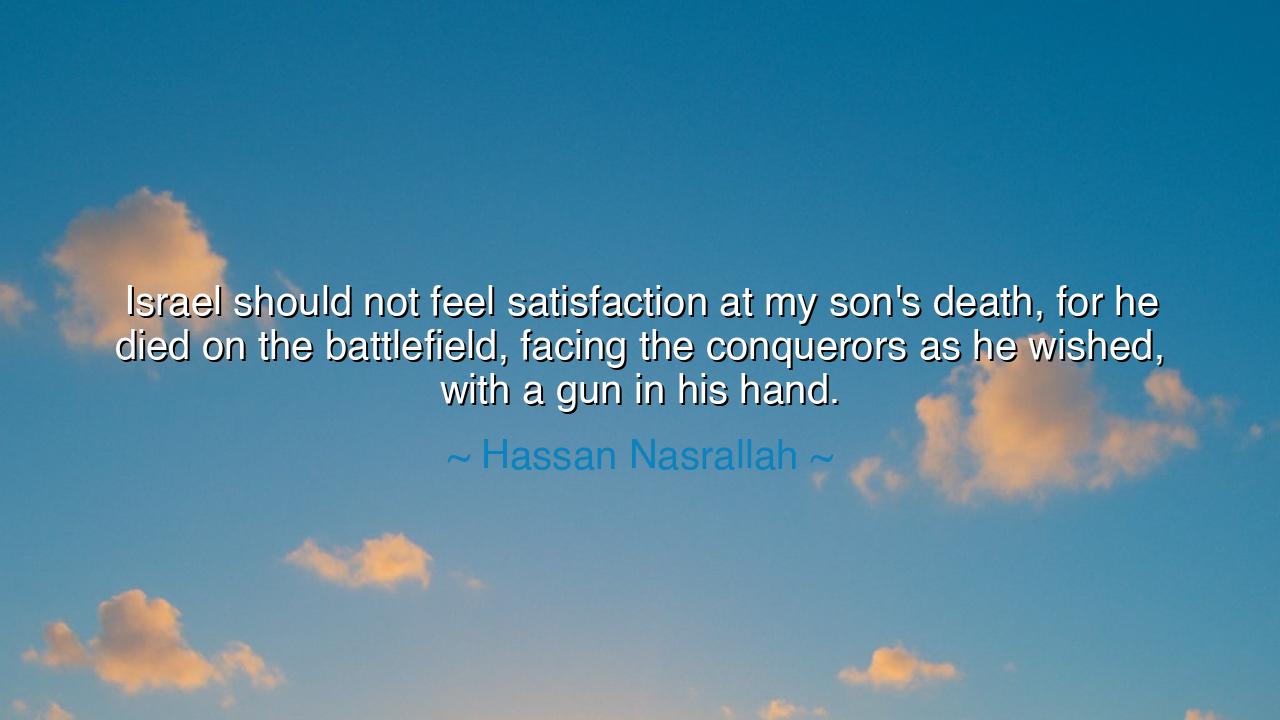
Israel should not feel satisfaction at my son's death, for he
Israel should not feel satisfaction at my son's death, for he died on the battlefield, facing the conquerors as he wished, with a gun in his hand.






“Israel should not feel satisfaction at my son's death, for he died on the battlefield, facing the conquerors as he wished, with a gun in his hand.” — thus spoke Hassan Nasrallah, the leader of Hezbollah, upon the death of his son, Hadi, who was slain in battle during the conflict with Israel. In these words, one hears not only the voice of a father mourning his child but also the voice of a man who has accepted the ancient laws of honor, struggle, and sacrifice. This is no ordinary lament — it is a declaration of dignity, of defiance, and of the belief that death, when embraced in the pursuit of one’s convictions, is not defeat, but fulfillment.
The origin of this quote lies in a moment of profound tragedy. In 1997, Hadi Nasrallah, the son of Hassan Nasrallah, fell in combat with Israeli forces in southern Lebanon. For any parent, the death of a child is an unbearable grief. Yet Nasrallah’s response was not of brokenness but of resolve. He declared that his son had died as he wished — not in surrender, not in flight, but “facing the conquerors with a gun in his hand.” It was the language of warriors, of those who see life itself as an offering upon the altar of principle. To him, the battlefield was not a place of ruin but of redemption, where purpose finds its highest expression.
Such words echo across the ages, spoken by countless fathers and mothers whose children perished in the flames of war, yet whose spirits refused to bow. The ancients would have recognized in this sentiment the voice of the heroic ethos — the belief that to die with courage is to defeat the conqueror even in death. Hector, the prince of Troy, knew this truth when he stood before the walls to meet Achilles, knowing he could not prevail. He told his wife, “I would rather die in battle than see the city burned.” So too did Nasrallah speak — as a man who saw in his son’s death not the extinguishing of life, but the preservation of honor. For in every age, those who fight for what they believe endure beyond their fall, while those who live without conviction fade though they survive.
In saying that Israel should not feel satisfaction, Nasrallah denies his enemies the victory of spirit. For while they may claim the life of his son, they cannot claim his submission. The father’s grief is transformed into a weapon of meaning; his mourning becomes resistance. He refuses to see his son’s death as a loss but as the completion of a chosen destiny — the destiny of one who met his fate standing, not kneeling. In this, we see a truth that transcends the battlefield: that even in death, one may triumph if one dies true to oneself.
History is filled with those who have turned sorrow into strength. When King Leonidas of Sparta fell at Thermopylae, his death was not an end but a beginning — it became the spark that roused all of Greece to resist the invader. When Imam Husayn, the grandson of the Prophet Muhammad, fell at Karbala, his martyrdom was not defeat but the birth of a legend of sacrifice that still moves hearts today. Nasrallah’s words breathe this same ancient fire. He speaks not only as a father of one, but as a voice for a people who find in loss the seed of endurance.
Yet his statement is not only a political declaration — it is also a meditation on how one should meet death. The world fears death because it often comes as an intruder, unbidden and senseless. But when death is met willingly, with purpose and courage, it is transformed. The wise of every age have taught that death is not the enemy; cowardice is. The warrior, the prophet, and the artist all share this understanding — that life’s worth lies not in its length, but in its depth. Nasrallah’s son, by his father’s account, lived and died as he chose: confronting those he opposed, unbroken in body and soul.
So, my child, let this be the lesson: we cannot choose whether death will come, but we can choose how we will meet it — in fear or in faith, in surrender or in dignity. To live with conviction, to act with courage, is to rob death of its sting. The one who dies standing for what he believes will live on in the memory of the living, while the one who lives without purpose is already dead. Let not your life be one of avoidance, but of presence — to face every challenge as Nasrallah’s son faced his last: with open eyes, with steady hands, and with the knowledge that meaning is worth more than mere survival.
For in the end, as Hassan Nasrallah teaches through grief and strength alike, victory and defeat are not measured in survival, but in the spirit with which we face our fate. The conquerors may claim the body, but they cannot claim the will. When one dies with courage, one leaves behind more than ashes — one leaves behind a flame that others will carry, through generations yet unborn, until justice, peace, or redemption is won.






AAdministratorAdministrator
Welcome, honored guests. Please leave a comment, we will respond soon